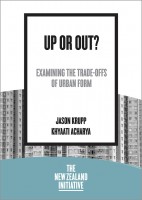The EU's unique definition of democracy
What is democracy? Well, usually democracy is when the people vote in an election and the winner then happens to form a government. Read more

What is democracy? Well, usually democracy is when the people vote in an election and the winner then happens to form a government. Read more
Wellington (4 June 2014): The New Zealand Initiative has expressed concern about a Fairfax Media report today that the RBNZ is not ruling out restricting mortgage lending according to household income multiples. Such a policy is currently being considered by the Bank of England under its new governor Mark Carney. Read more
This week the Minister of Education, Hekia Parata, released a report on the details of the government's $359 million policy to create a new career structure for teachers (Investing in Educational Success) following consultation with the education sector. The Beehive media release makes it sound as if everybody is happy as a result of the consultation, and most are, including the secondary teachers' union, the PPTA. Read more

With a greater number of local government bodies having adopted a compact city development strategy, or in the process of considering it, The New Zealand Initiative set out to examine whether these urban forms deliver on their stated benefits. The compact city school of thought is built on the belief that cities should be sustainable in their use of resources, and while this takes many policy forms, it is principally expressed in restricting the outwards spread of the urban footprint. Read more
An Insights reader recently wrote in with a thoughtful question: how could we advocate for the release of land in New Zealand cities as a means of tackling the housing affordability crisis and promoting economic growth? They noted that continued growth, driven by population expansion, is not sustainable in the long term. Read more
The constant striving to improve one’s lot is human nature, and people naturally move to where the opportunities lie. But when moving house and moving jobs involve children, these moves become controversial. Read more
Try to envisage a world in which you wake up every morning from your bed, manufactured by Kiwibed, prepare your breakfast of Kiwibread and Kiwicoffee, and put on your clothes – made by Kiwiclothes, no less. This may sound like a nightmare to some, where practically all goods and services are produced by nationalised and monopolised industries, and are shielded from the price-reducing effects of private competition. Read more
If markets are anything to go by, last weekend’s elections to the European Parliament delivered a good outcome, promising stability and predictability for the continent. Across Europe, stock indices soared on Monday: up 3.4 per cent in Italy, up 2 percent in Greece. Read more
Budget day last week was dominated by the usual focus on the return to surplus, some new spending pledges and discussions around potential future tax cuts. Soon afterward, however, commentators and politicians discovered that the Treasury papers contained some political dynamite outside the core of fiscal policy: a projected rise in net migration figures. Read more
Last week the New Zealand Initiative joined the chorus of approval for Finance Minister Bill English’s sixth budget. And rightly so. Read more
If a week is a long time in politics, it is an age in business, especially for those sectors of the economy exposed to political volatility. Just ask the listed electricity companies, whose share prices are still wearing the effects of the single buyer policy the Labour and Green parties launched one year ago. Read more
Money is the modern economy's essential lubricant. But for money, there is only barter trade—and poverty. Read more
Wellington (20 May 2014): The New Zealand Initiative has expressed disappointment that proposed reforms of Resource Management Act (RMA) have been abandoned, calling it a missed opportunity to address skyrocketing housing costs. The National Party’s bid to overhaul the legislation was stymied after coalition partners United Future and the Maori Party withdrew support for the reforms citing environmental concerns. Read more
Every corner you turn, there is another nature-loving, compost-making, bike-riding, community-befriending greenie - you know the type - they knit their own yoghurts. Perhaps this is because I live in New Zealand's oldest hippie suburb, Aro Valley in Wellington, but it seems the resurgence of green-thinking is not limited to this one neighbourhood. Read more
Wellington (19 May 2014): The New Zealand Initiative today announced that Dr Eric Crampton has been appointed as its new Head of Research. Dr Crampton, a senior lecturer at the University of Canterbury and author of the popular economics blog Offsetting Behaviour, will take up his new position in August. Read more